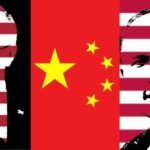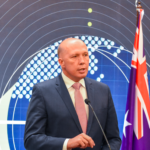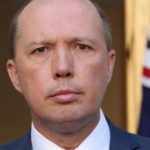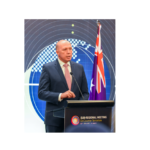To “Preserve Peace Is to Prepare for War”, Declares War Minister Peter Dutton

On reading Nineteen Eight-Four as a teenager, defence minister Peter Dutton became inspired by the society George Orwell envisaged for the future.
While it was true, by the time he read the book, the actual year had come to pass, young Peter understood this vision could still be realised.
The ideals of constant war, mass surveillance, the disappearing of peoples who don’t conform to the norm, a tendency to authoritarian rule and his gifted use of language whereby he can convey certain truths whilst concealing them simultaneously, all show his commitment to the Orwellian vision.
“The only way you can preserve peace is to prepare for war,” the defence minister told some of the ever-compliant mainstream media on Anzac Day. “And to be strong as a country. Not to cower or be on bended knee or be weak. That’s the reality.”
Since taking over the defence portfolio in March last year, Dutton has been quite persistent in ensuring that the Australian public is aware that the threat once inherent in the Middle East actually exists in China. Again, displaying his ability to swiftly rewrite history to preserve constant war.
“We’re in a period very similar to the 1930s,” the minister said on Monday, making an obvious comparison between the rise of Nazi Germany and the growing ambitions of Xi Jinping’s China, and he threw in another example by likening Vladmir Putin to Adolf Hitler just for good measure.
“I think there are a lot of people in the 1930s that wish they would have spoken up much earlier,” Dutton continued, which is a statement that reveals that Australians are lucky enough to have a war minister like him who’s cranking us up in readiness to fight for our freedoms as soon as possible.
Freedom is slavery
In his previous role as home affairs minister, the freedoms of Australians were a constant concern for Peter Dutton. As head of law enforcement and intelligence, he meticulously displayed this through the plethora of national security bills he drafted and oversaw the enactment of.
Via his 2018 TOLA Act, Dutton progressed our liberties by setting up a three-tiered system that provides law enforcement and security agencies with access to citizens’ encrypted messages by requiring communications providers to give assistance in gathering that data.
Dutton also drafted and introduced the much-lauded Identify and Disrupt Bill 2021. Passed after he’d moved onto defence, this bill gifted the AFP and the Australian Criminal Intelligence Commission with the powers to gain control over citizens’ electronic devices and online accounts.
While these bills are by no means the limits of the surveillance powers he enshrined in law, both of them do contain one of the most inventive rights he provided Australians, which is the right to have agents “add, copy, delete or alter” any data on our devices and accounts they gain access to.
Big Pete is watching
Obviously, there’s been one obstacle standing in the way of minister Peter Dutton in realising the full utopian society set out in Orwell’s 1949 novel, and that’s the fact that Scott Morrison is continuing to hold onto the position of prime minister.
And in looking at the state of the nation, it’s quite apparent that while the PM can play politics, he doesn’t have the strongman edge that Dutton has, and nor does he have the mettle to pass laws that would bring about the degree of control over people’s lives that would provide true freedom.
Indeed, part of Dutton’s vision was to set up a nationwide biometric facial recognition system that would permit law enforcement to match images from CCTV cameras with the identification photos of all citizens through a centralised hub in real time, meaning anyone could be identified anywhere.
Of course, this system failed to eventuate under Morrison’s watch. But we can rest assure that if Dutton ever gains control of the top office, we’ll all enjoy constant monitoring and identification whilst in public, and the march towards war with China will be expedited in the manner it should be.







